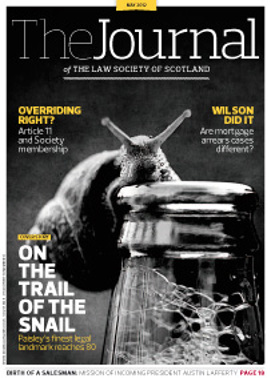Take the heat out

A large and growing percentage of solicitors are now aware of the potential of mediation as a form of dispute resolution that can frequently obtain more satisfactory results for the client than traditional litigation. According to a recent study, for example, 58% of contentious construction lawyers surveyed had represented parties in a mediation, up from 35% a few years earlier (Agapiou and Clark, Journal Online, January 2012: find at bit.ly/sxjnjq). Its ability to restore relationships between parties in positions of conflict, and to enable them to emerge from the process feeling both heard and healed, have been well documented.
How many, however, have considered undergoing mediation training themselves? A likely first reaction of many would be to assess its value in terms of the number of occasions in which they might use it to assist clients through a formal mediation process. But those who have been through the training testify that the techniques and principles that underpin mediation can be used to beneficial effect in any situation of actual or potential conflict – in the workplace, handling complaints from clients or, indeed, in personal life.
Eye-opener
Eilidh Wiseman, head of Dundas & Wilson’s employment group, is one who admits to having found the experience something of a process of self-discovery. “I suddenly became aware that table thumping would not always get the right result for my client”, she says. “To have my long-held adversarial views turned on their head was revolutionary.”
Wiseman believes the training has improved the way she deals with her children, her business, her colleagues and her clients, giving her a maturity which she might otherwise not have achieved. “I became self-aware in a new way. The training taught me how to deal with disputes in my profession, but it also made me think about the way I act in my personal life. I am no longer as hesitant to consider someone else’s view and I am quick to recognise steps to remedy my mistakes.”
While mediation training is designed to help resolve situations of conflict, it can also instil the confidence to face up to situations that we might otherwise duck. Thus it enables us to deal with those behavioural conventions and anxieties about security and other issues that often prevent people from speaking their mind, particularly in the workplace, a lack of communication that can paradoxically create conflict.
Richard Scothorne of Rocket Science Ltd, a consultant in the area of organisational change and performance in services for the public, says he previously found himself “tiptoeing away from some difficult situations, not having the means or confidence to deal with them”, but that the tools and processes he has learned through mediation training have given him the confidence to give space to people and feel more comfortable in a situation of conflict.
“Already it has allowed me to stretch my range in the field of facilitation, dealing with issues I would have avoided, helping organisations tackle problems and relationships that are constraining their performance,” he comments.
Family lawyer Alison Edmondson of Sheehan Kelsey Oswald thought she had a good idea of what the training would achieve, but admits she had “significantly underestimated the personal and professional impact that the experience would have on me”.
For instance, she explains, “the skills I acquired revolutionised my approach to dealing with litigants in person, an increasing feature of family law. Influenced by my mediation coaches, I have the confidence and skills to approach unrepresented parties more humanly and more effectively – for them and my clients.”
In addition, she now finds herself able to consider mediation itself as a viable option well beyond the circumstances in which she had formerly done so – and now looks forward to a time “when it is the instinctive perspective of practitioners to see mediation as a preferred option” across her practice area.
Wider applications
In the field of client complaints, those who have undertaken training are convinced of its value in helping the complainer feel they have been listened to. “The importance of accepting what you hear, whether you agree with it or not, is another matter – but acknowledging something rather than challenging it usually is a good place to start,” says one senior manager, adding that if a business spends a lot of time and money on efficient communication methods, it is only good sense to engage properly with those who complain by attempting to communicate with them effectively to resolve the dispute.
Regulators such as the Financial Services Authority are now looking carefully at what those subject to their jurisdiction do to ensure that customers are treated fairly in the complaints handling process, something to which mediation practice is highly relevant. And mediation is one of the five stages of the Scottish Legal Complaints Commission’s complaint handling process; the Commission is currently carrying out an investigation of the processes adopted within legal firms.
Those working in the public sector have found other applications. Stewart Carruth, director of corporate governance at Aberdeen City Council, believes there is an opportunity to apply it “early and upfront” in the delivery of public services.
“The key point is that mediation is utilised early in the community planning process to shape decisions, rather than later in the process after decisions have been taken and funding distributed,” he says. “The tools and techniques of mediation – rapport building, exploration, confidentiality, seeking authority, negotiation, options appraisal and decision-making – all support the various parties: the local authorities, other public sector organisations, the voluntary sector and individuals, as they take decisions on investing limited funds on projects in the community.”
Among its benefits, he explains, will be a greater chance of collaboration, vested interests being explored and opened out, strengthened relationships, and agreements reflecting negotiated decisions based on outcomes.
It has even been suggested that the formalities of the planning system would benefit from the application of mediation techniques – who, after all, has come away from the processes connected with the Aberdeen Bypass or the Beauly-Denny power line feeling that relationships have been built or strengthened?
But perhaps it is when one hears a human rights practitioner speak of its potential that the extent to which mediation principles can pervade legal practice becomes apparent.
As Shelagh McCall of the Scottish Human Rights Commission explains: “There is potential through a mediated process to arrive at agreements that enable greater realisation of a wider range of human rights across Scotland. Even where agreement cannot be reached on specific matters, the act of collaboration between individuals and policymakers to devise and implement a national human rights action plan will empower affected individuals to find their voice and seek to influence decision-making. It will enable those responsible for delivery of services to increase their ability to recognise the human rights issues at stake and take them into account.
“Agreement or not,” she adds, “the outcome should be greater respect for human rights. In mediation terms, a win-win situation.”
Targeted training
A number of mediation providers, in Scotland and elsewhere in the UK, offer training courses for those wishing to learn and apply mediation techniques. Courses commonly offer, singly or in combination, topics such as managing conflict, negotiation skills, and mediator practice and accreditation.
These courses are often tailored to the needs of a particular business or organisation, while open courses, such as those offered by Core Solutions, attract a diverse mix of participants from the legal and other professions, the public sector, the worlds of commerce, sport and consultancy, and even the voluntary sector.
Core’s chief executive, John Sturrock, comments: “Over the 10 years we have been offering this training, we have seen solicitors from nearly all of the larger firms participate – often because being able to offer clients an understanding of how mediation works, from the inside as it were, is recognised as a valuable service. But involvement extends to sole practitioners, who are seeking to develop a niche practice, and others from rural settings who anticipate the benefits that having these skills will bring to their firms.”
He points out that the fact they can mix with those attending from a range of other sectors often results in strong networking connections which endure well beyond the end of the seven days of training.
Sturrock estimates that several hundred solicitors (and members of the bar) have participated in mediation in Scotland in recent years, many of them on numerous occasions.
But he says the training adds a further dimension: “I believe that we are seeing a change in how lawyers approach contentious problem solving. Many skilled practitioners now use the skills we associate with mediation – and effective negotiation – to achieve more creative, cost-effective and speedier outcomes for clients.
“Often that will involve engaging a third party facilitator – a mediator – but on many more occasions, that will mean resolving difficult matters co-operatively with their counterparts. That must be a good thing for clients – and for the profession as a whole.”
- For a book review of a title with more on this subject, see Journal, August 2011, 54
In this issue
- Arguments in store
- Farming the constitution
- Willing to wound, yet afraid to strike?
- Deferred consideration – worth the paper?
- OSCR: the secondees' perspective
- To efficiency and beyond
- Reading for pleasure
- Opinion column: Fraser Tait
- Council profile
- Book reviews
- President's column
- Wind farms: a challenge to registration
- Snail of the century
- Rights both ways
- Sell, sell, sell
- RBS v Wilson: light in the tunnel?
- Take the heat out
- Prepare for case management
- Looking into the past
- Migrant days numbered
- CPI - the story so far
- Brighton declares
- Mary Mary quite contrary?
- How to avoid that Guarantee Fund interview, and worse...
- Law reform roundup
- Apportionment of price for SDLT
- Business checklist
- Practical guide to legal risks
- Ask Ash






